In 1995, following a liver transplant, Rory Gallagher – one of the foremost guitar players the world has ever seen, picked up a post-operative infection and died. The loss to his legions of fans was tragic, for this most unassuming of musicians; a character who lived heart and soul for the beautiful sounds he was capable of producing; to fall in such a way was bafflingly senseless and even now you will meet musicians and fans alike who will brighten at the very mention of the talented guitarist whose back catalogue is an embarrassment of riches just waiting for new generations of guitar aficionados to discover.
With the first six Rory Gallagher records re-mastered and re-released last year as part of the 40th anniversary celebrations of Rory’s debut, Sony Legacy have just unveiled the second phase of releases. Covering the period 1975-1982, each one painstakingly remixed and re-mastered by Rory’s nephew, the talented Daniel Gallagher, from the original ¼ tapes, the five albums (including Donal Gallagher’s favourite – the elegant ‘Calling card) showcase Rory as he developed and honed the sound that he had first unveiled on his self-titled debut album originally released in 1971 following the dissolution of his first band, Taste. Listening now, even at a remove of some forty years, it’s easy to see not only the appeal, but the inspiration. Rory was a musician whose passion shone out of each and every release. Utterly electric on stage (as evidenced on ‘Live in Europe’ and ‘Irish Tour ’74’), Rory invested his heart and soul in the sublime solos he wrung from his instrument and as such his work still blazes with the same fire today as it did when it was first released.
To celebrate this next phase of re-issues we, somewhat nervously, requested an interview with Rory’s brother, and former manager, Donal Gallagher whose experiences on, and off, the road with Rory paint a colourful and vivid picture of the man behind the music. Softly spoken, gentlemanly to a fault and beautifully enthusiastic when expounding upon his brother’s legacy, Donal generously took us through Rory’s history, and I am very proud indeed to present this transcript of the discussion to you. So, without further preamble, cue up one of Rory’s many fine albums and discover the importance of Rory’s legacy.
Even from a young age I think Rory was very focused on playing music is that right?
Correct, yeah, being the younger brother I imagine that he must have been about 5 or 6 and he was already seriously interested in music. Our father was a piano/accordion player so there was a gene in the family to begin with and our mother was a good singer.
So it was a family influence to take up the guitar then?
No, not the guitar as such. It was more that my father particularly was… well he wasn’t a well-known musician but he was a champion accordion player so he had that dexterity that Rory got I presume. The guitar itself wasn’t a common instrument so my parents didn’t really understand the instrument he was asking to get and I think it was eventually when Roy Rogers was singing ‘Cowboy’ – he was in the comics in those days – it finally clicked with them what he was after as an instrument.
He was also a very talented singer – was that something he pursued from an early age as well?
Yeah – I mean it was all part and parcel of his drive and the delivery of the song.
When did he start developing his own ideas?
It would have been in the mid-sixties so he would have been about sixteen/seventeen were the first couple of compositions he recorded. He was playing with an Irish show band. Rory joined the band when he was fifteen and they were a professional dance band playing the dance halls in Ireland and they were much older than him so by about the age of sixteen/seventeen he had written a couple of compositions that were very Buddy holly influenced – that style of writing to the point that they actually recorded them.
As brothers did you grow up listening to and discovering music and bands together or did he go off and do his own thing?
No, we grew up together and I was very much led by Rory’s enthusiasm because, while we moved location, principally we were living in Derry which, post-war, was still the US Navy port following the second world war, so they still had their naval base. They had their own AFM station that they would broadcast. So Rory had managed to figure out on the radio how to pick up this music, which I found very intimidating because he was listening to Jazz, Voice of America, programmes like that, and to me it was all very weird compared to the Irish music we were hearing . And then he was very much into Chris Barber and that fifties Jazz movement which, out of Chris barber’s band you had Lonnie Donegan the banjo player.
it was Chris Barber who created skiffle, if you like, so I became caught up with Rory’s love of the music skiffle because he would train me to harmonise with him; and a lot of those songs had call back lines so I would always deliver the refrain for that line. Then he was looking for his own skiffle band so I was press-ganged into that as well as a couple of pals (and we’d moved to Cork in that period) so by then he was stage struck and he would perform at church socials and hospitals. So I’d go along with him and harmonise the Everly Brothers’ songs.
Did you play drums very early on in Rory’s career as well?
No… that would have been my instrument had I been allowed, but I think the folks, once they realised the electric guitar had an amplifier, there certainly wasn’t a drum kit coming in the house so I didn’t! Later on, various drummers with Rory would show me various tips and tricks but we had a row on stage one night and I got fired by him so he would never allow me back on stage! So the only occasion I got to play drums with him was in Birmingham when the band couldn’t get up the M1 because of fog. So we’d been up early in the afternoon doing promotion and he put together an impromptu band and I was put in on drums, but that’s the only occasion I can think of, other than in the studio for rehearsals when I would put together a drum beat but I wouldn’t have been that competent to be honest with you.
With a lot of artists you hear that they live for the few hours on stage but, as I understand it, with Rory it’s not hyperbole – it’s the reality that he was so focused on his performance and his art is that right?
Oh, very much so. In one of his songs he refers to a little Doctor Jekyll and a little Mr Hyde and he was a Jekyll and Hyde on and off stage. That was what he lived for. He used to suffer stage fright before going on stage, but I realised that was down to the adrenalin and the excitement of leaving the mundane and getting on stage and performing. The difficulty would be that Rory would do extended sets of two to three hours or longer, if he could get away with it, purely because he loved performing and being on stage.
Then the other condition would be that after the show he wouldn’t want to leave the building. Even in the most Spartan of dressing rooms, he’d linger where the music was and where the performance was… you’d have to prize him out of the building.
That must have been difficult on the rare moments of downtime between shows and tours?
Yes it was and that then ultimately had a negative effect to his health. The rigours of touring and travelling physically take it out of you, but if you need to be on the road constantly and have a schedule – and that is what he required, then there’s no downtime and effectively the only downtime was to do an album and the only reason to do an album was to create performance music that he could then go off and tour and perform on stage. It was quite a one-track lifestyle if you like.
One of the biggest differences that I can see between the early days of rock ‘n’ roll and what we have now is that many modern bands take a long time to create a record. Sometimes that can be great, sometimes detrimental but for a lot of the early bands – Black Sabbath and of course Rory himself – albums were recorded very quickly…
Oh yeah – certainly. There were two albums a year which would be unheard of today. It was ’71 when we came out with the first Rory album and then he had one by the Autumn and that was followed the following year by ‘Live in Europe’ and then ‘Blueprint’. In fact he shocked the record company because they did a six album deal at Polydor for the first solo album and between ‘71 and ’74, in those three years he did the six albums.
That’s so furiously inventive – a lot of material must surely have been honed on the road?
Totally, yes hotel rooms, just travelling in the bus or whatever and they were constantly writing. Rory didn’t seem to have a lot else in his life. Composing was just… he read a hell of a lot and was reading and taking a lot of inspiration from books.
Is that where the lyrical inspiration comes from – the reading and travelling that he did?
Well partly yes. I remember asking, because I didn’t quite understand the inspiration for some of the songs, one case in point was ‘daughter of the everglades’ which was such an unusual theme to go for and he did tell me – “I was reading a book and that was about an inspiration in the Everglades and that was inspired me to write the song.” Then he read a lot of crime books because he was particularly a fan of those so a lot of the songs he wrote had a crime base to them – a sort of pulp fiction type inspiration.
So there’s a wide range of material?
Yeah – for example ‘Seventh son of a seventh son’ was about a faith healer, but then it was drawing parallels between a guy who was an Irish faith healer at the time and a lot of the suspicions or superstitions were shared by blues music where you have a lot of Voodoo and that sort of thing so there were a great variety of sources.
One of the things I understand about Rory is that he was very much against singles and that seems a very laudable stance given how disposable modern music has become with ITunes and so on – is that the case – he just wanted to put out albums and move on to the next thing?
Yes I think with hindsight it was to his detriment because you won’t hear him on most of the radio, or even the classic rock radio as they call it, he won’t feature because he didn’t have a hit single and there’s no milestone. All of the DJs on the radio will tell you that they love Rory but there’s nothing for them to pick up on and you do need those milestones. I used to say to him, because I was always advocating the fact that he should release a single and I felt that he had songs that certainly had the potential to be hit singles if you like. He’d mull it over, and then he’d think about it and he’d perhaps consider it – he’s go half way to releasing one and then a week before hand he’d pull some rug and he’d pull out of the venture and disappoint the record company invariably.
I think there was probably a slight naivety. Radio was going in one direction when you had Caroline and the pirates and you had people like John Peel who were going deep into albums and playing tracks and so you were getting airplay and I think belief in American FM radio and college radio was a similar thing, so I think Rory felt he didn’t want to be prized into doing ‘the follow-up single’ because he’d seen too many artists have hit singles and not being in a position to follow up that single and, not that their career was necessarily over, but it damaged their careers more than anything else. Artists like Lonnie Donegan who had massive selling singles like ‘Rock Island Line’ and then they’d have to follow it up with something like a Vaudeville comedy thing that, while it would be a hit single, would be the death-knell for the next singles so he didn’t want to be measured by them.
That must have been quite difficult for you caught between Rory’s desires and ambitions and the record company on the other side.
Oh very much! I mean because company executives only understand one thing, which is getting the attention of the radio and media, and the cheapest way to do that is a single. Breaking an album and getting album sales is so much easier with a hit single to follow it through. They would plead with me, and I’d try to intercede with Rory. I remember in the early days with Polydor in America, there was a track called ‘going to my hometown’ which was a mandolin track, and certainly it is hit single material, so they edited it to a three minute single and presented it to Rory and he was absolutely furious that they would even contemplate editing the track and presenting it that way so I think that frightened everyone off from trying that again.
Later, during the Christmas period from the ‘calling card album’, to take the current crop of reissues, there was a track called ‘edged in blue’ and I remember the co-owner of the company saying if Rory would come in after the one minute guitar intro and edit bits of the track he would guarantee us a number one single in America so far as he could and, again, Rory was ballistic that they would even think of it. Plus, they were never worried about Rory’s sales because he was always on tour and he was doing so well live that he never required tour sponsorship or funding on the road, so they kind of went, ‘well, let him be’ because the people who went to his concerts would invariably buy the record so they just let him do it his way.
Particularly in recent years there seem to have been a wealth of Rory-related releases – there was the ‘ghost blues’ documentary, the ‘notes from San Francisco album’, the lost album as it were, it must be wonderful to see that Rory’s legacy is so well regarded and so much in demand as well.
Yes – I’m very proud of that fact. Given, when you know first-hand a person put into creating the music and probably not quite seeing the fruits of their labour, so in some ways it is very satisfying to see that that has happened and I must give credit to a son of mine, Dan, who works with me. He’s also a guitarist and, particularly, the ‘San Francisco’ album was going to lie on the shelf because, at the time Rory first recorded it, he’d set it to one side and I always felt nervous about even tackling the mixing of that, or even going back there; so it’s good having that support and particularly someone who’s family as well – of a personal nature you feel that he family will see the same point of view that you’ve got anyway.
It seems wonderful, particularly with the record companies fighting for survival and the music business being regarded as quite cut-throat, that you and Daniel are there protecting Rory’s legacy and making sure that the reissues are put together with such care and attention to detail…
Thank you – it’s really what Rory deserved and it’s done with Rory looking over our shoulders because I know that Rory himself, and the detail he went into with the album covers and the mixes; even the cuts – he attended all the cutting sessions and he might do ten different cuts of an album – the several, umpteen mixes he would go through and he’d do the album with five different engineers and so on. So he was meticulous, and we’re lucky to have the legacy to look after so all we can do is do exactly what he would do himself perhaps.
Obviously you’re very close to everything, having been there on a day-to-day basis, and being Rory’s brother, but is there one album that you feel you’re particularly fond of because it represents Rory or gels with the memories you have of him?
I kind of break them down into two categories because there are so many live sets and then the studio albums, so the live albums aside, from a studio point of view I would say ‘calling card’ has to be a favourite.
What is it about that one that resonates with you?
I suppose it is the collection of material and I’ll probably wake up at two O’ Clock in the morning and think “oh what did I say that album for!!” and come back and listen to some of the other albums. I think, if you’re being put on the spot for a desert island disc, it shows the range of musical talent he had. ‘I’ll admit you’re gone’ is a very heart breaking blues song, I mean lyrically the way he’s written that and the instrumentation – the colouring of it – through to ‘country mile’ which is an all-out, slide-guitar at its best and I think it’s got everything on there; and of course ‘barley and grape rag’, the acoustic track, so I think showing the full range of Rory’s talents it’s there, you know?
One of the things that caught my eye when I started listening to Rory’s music was that there was a wealth of artists ready to pay tribute to Rory and I was wondering in modern music is there anyone particularly you hear Rory’s influence standing out in?
Amongst the younger players – Joe Bonamassa, certainly you can hear an influence, but then I can hear a lot of other people’s influences in him as well. In newer bands, it’s very difficult because I see so many bands who replicate Rory’s music as well and I’m probably so caught up in going to see Rory tribute bands that it’s kind of difficult to say. But Joe Bonamassa – I’d point him out certainly.
Perhaps it’s as much the spirit that he represents as the music he played that represents such an influence?
Yes, certainly. The jobbing musician – it’s the musicianship first, not the hype and rock ‘n’ roll lifestyle that is perceived to be around it. Also I do know that Rory adored other musicians and the friendship of other musicians and that meant so much to him and if he was being interviewed he’d start telling you about a whole list of other musicians who were unheard of, or he’d start publicising them, not to his own detriment, but I think it’s a lovely side of a musician when you’re speaking to hem and they’re telling you about all these other bands you should see. I found the guy from Mumford and Sons, the banjo player, I met him in recent times and it’s a lovely trait in musicians when they start telling you about all these other people and when you start complimenting them and they go – “oh well now you should listen to this…” Rory was very much like that and it’s part of the tradition and you see it a lot currently in Ireland and you see it a lot in the traditional musicians, that they have no airs and graces about ideas of stardom – it just isn’t in that line of work – perfectionism and knowing your craft and continuing to perfect your craft.
That seems to define the difference between being a musician for the love of playing and being a celebrity.
Indeed – yeah – so many good musicians get caught up in playing the Hello! Magazine game and it ultimately ruins them in a way , you know, living up to the image that they’ve created in thefirst place, be it the flash car or whatever, instead of getting on with the job and using the talent they’ve been given.
How did you end up managing Rory – because when he was in Taste I think you weren’t involved?
No I was the road manager for Taste. Being Rory’s younger brother – Rory had formed Taste so he was already making trips off to Hamburg and the air bases and Spain and finding work, basically, for his early band. I was finishing off school and then college and as soon as I got released from school I went off and, by now Taste were established up in Belfast, and so I joined him up there, I think it was in late sixty-seven and I was sort of ducking off the end of college to be with them. So I was on the road as a tour manager with Taste and in sixty-nine we went off to the States and their first tour was the Blind Faith tour so that was my real education
That seems like a very difficult world to break into – the music business – and you being caught between Rory who wanted to produce his art and the label that wanted ‘unit shifters’ – it must have been a steep learning curve?
Well, yeah, and there certainly weren’t any of the lawyers and accountants that are common-place in the music industry now to give you advice either. It was Rory’s management, in effect, that caused the band to split up. Effectively, from a financial point of view, bad management practice back in 1970, so on the very last tour – the farewell Taste tour – the opening act was Stone The Crows and, by chance, their co-manager was Peter Grant
The Peter Grant??
Yes – The Peter Grant – and unbeknownst to me he was helping with the equipment one gig in Guildford and I thought it was just a guy trying to get a free ticket because the show was sold out and he was a huge guy, and also an ex-wrestler, so this guy was quite handy and he started to enquire as to the demise of the band. At that time I was sworn to secrecy, to Rory, not to talk to anybody about his feelings – he was a very private person – and I found myself downloading to this guy and he said “well, why doesn’t he talk to me?” and I said “well, hang on – why should he talk to you – you’re lucky to get a ticket into the gig!” and he said “no – I’m here to look after my own band, I’m Peter Grant!” And Peter then enquired through Polydor because he had connections – the early Zeppelin records were on Atlantic which was Polydor as well – and Rory did go and see him and he did really become a good friend to Rory and he was also the one who negotiated the first Polydor contract for Rory because at that time Rory was being coerced into an agreement whereby he would be retained by Polydor and the old manager would be let go but still retain an override. It was a very complicated arrangement which wouldn’t have suited Rory at all and we have to thank Peter in that respect because the deal Rory got then meant that he owned his own copyright from seven years after delivering his last album and, as I said earlier, I don’t think Polydor quite expected to have six albums delivered in three years so, in a ten year cycle to walk away with your catalogue was virtually unheard of at that time.
Even less so now – that’s remarkable!
Yeah – well I was keen to learn what I could from anybody because there were no colleges or night courses of classes, so you were really picking it up backstage from the experiences of other musicians or managers. It was a bit of a guessing game and frankly we got lucky. But, that was at the expense of Rory not really getting his fair dues from Taste. But he moved on and that was the thing to do.
Recently there have been a lot of records re-mastered and remixed and there is always a debate amongst fans over the quality of the work – did you feel any pressure when working on these re-masters to make sure they were done right and as Rory would want them to be?
Oh absolutely and once again I have to let Daniel to take credit, for this set in particular, because when Rory died in ninety-five and then, a year or two later, we bought the albums back out at that time because he had been out of contract so we had to find a new home, the pressure was on at that time to do remixes and also some of them hadn’t appeared as CDs so you did have upgrading some of the material. Now at that time it felt the right thing to do but, with hindsight it was tampering a wee bit and while the mixes highlighted other instrumentation and variations, at that time it seemed right to do it, but looking back over the years… so what Daniel did was to go back and get the original ¼ inch mixes that Rory himself had done and, as I said earlier we were always very confused because Rory would do several mixes so it was always very hard to identify whatever notes were on the boxes, so Daniel made it his business to get exactly what Rory wanted, but obviously applying the quantum leaps in technology that you have today. He worked with Martin, his bass player who’s also an engineer, and they’d come back and play me stuff and we’d listen to each mix. Now, I recognise that the difference between having a musician’s ears and someone like myself who could perhaps be called an audio engineer… I used to do the outside live mixes; so what you’re wanting to hear as an audio engineer is different from the way a musician wants the sound to come across at you.
So somewhere between the brother, the audio engineer and the manager something worked out because they sound fantastic!
Well each instrument was cleaned up in the mastering – they were polished. And we were fortunate in having the tapes because there was a tendency when CD and digital first came for most artists and most people holding tapes to consider they were taking up too much space and have them disposed of because it was felt that now we have digital we’d never need the tapes again. I think the fundamental thing for us is having those original recording tapes so you’re going back to the pure source- the true well as we say, not playing around with something that was changed digitally and then changed again.
My final question I think – what is your most vivid memory of Rory as you listen to his music?
I suppose his defining characteristic was his sense of humour, which I think is always the way, a person’s wit is how you see their intelligence. I’d say that’s more what I miss than anything else. I look back fondly at the quips in the studio or remarks at playbacks or… Most times he didn’t like me in the studio with him, he much preferred that he got on with it and then the next morning he’d sit you down to pay it to you. He felt I was too disruptive, perhaps, in the studio in the sense that it was another engineer as I was the guy who did the gigs and would say “oh well – wouldn’t you think about doing that?” and start tampering – which didn’t work. I suppose it’s just his witticisms and his humour.
And with a few more words Donal is gone, leaving us with a remarkable insight into the life of a consummate artist; a passionate and dedicated musician whose stunning achievements still inspire and excite today. It would be easy to dwell on the tragic loss of someone so unique, but the Donal, and the re-issue campaign in general, celebrate the remarkable life of Rory, rather than mourn his death, and I can think of no more fitting tribute to Rory than to sit back, put on whichever of his albums is your favourite, and just immerse yourself once again in his extraordinarily emotive playing. That Rory was a unique individual there is no doubt, but the elegant, haunting, stirring music he left behind will continue to pay tribute to his memory for many, many years to come.
Rory Gallagher’s re-mastered back catalogue is available now through Sony Legacy.
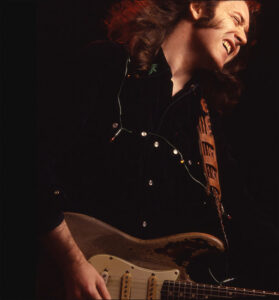
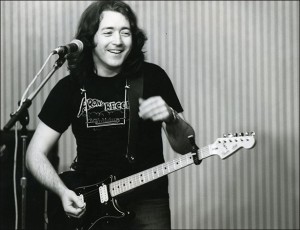
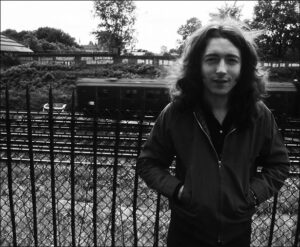
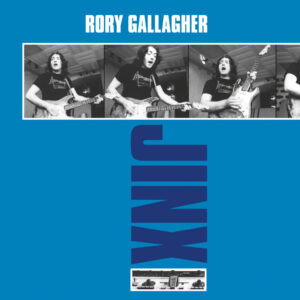
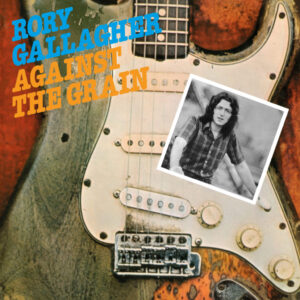
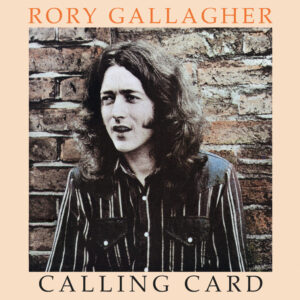
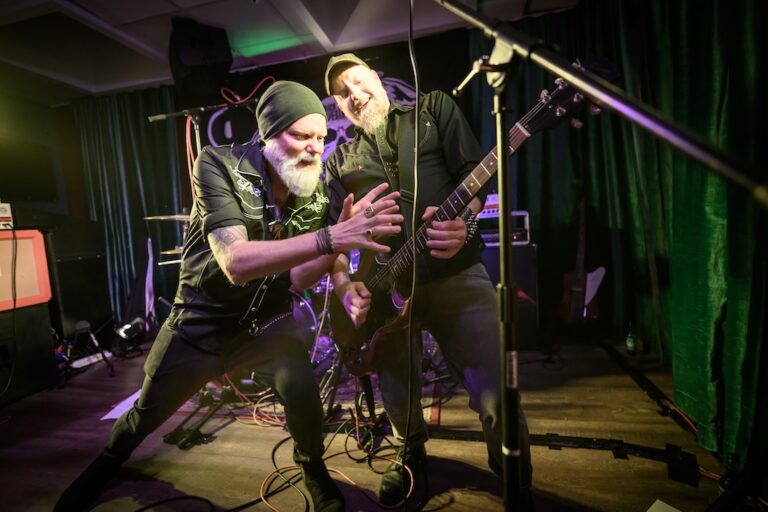



great interview :~)
I was so far into folk music back in the 70’s that I totally missed Rory then… grateful to the hordes of people who have kept his music, and the footage of the live performances alive :~) It’s only been a year since I first discovered him when my remote flew out of my hands and the channel changed to Ghost Blues… the rest is history… immersed in his soul playing… his quiet soul that screams upon the stage… I picked up my guitar again that night and haven’t put it back down. Rory’s spirit urges me on